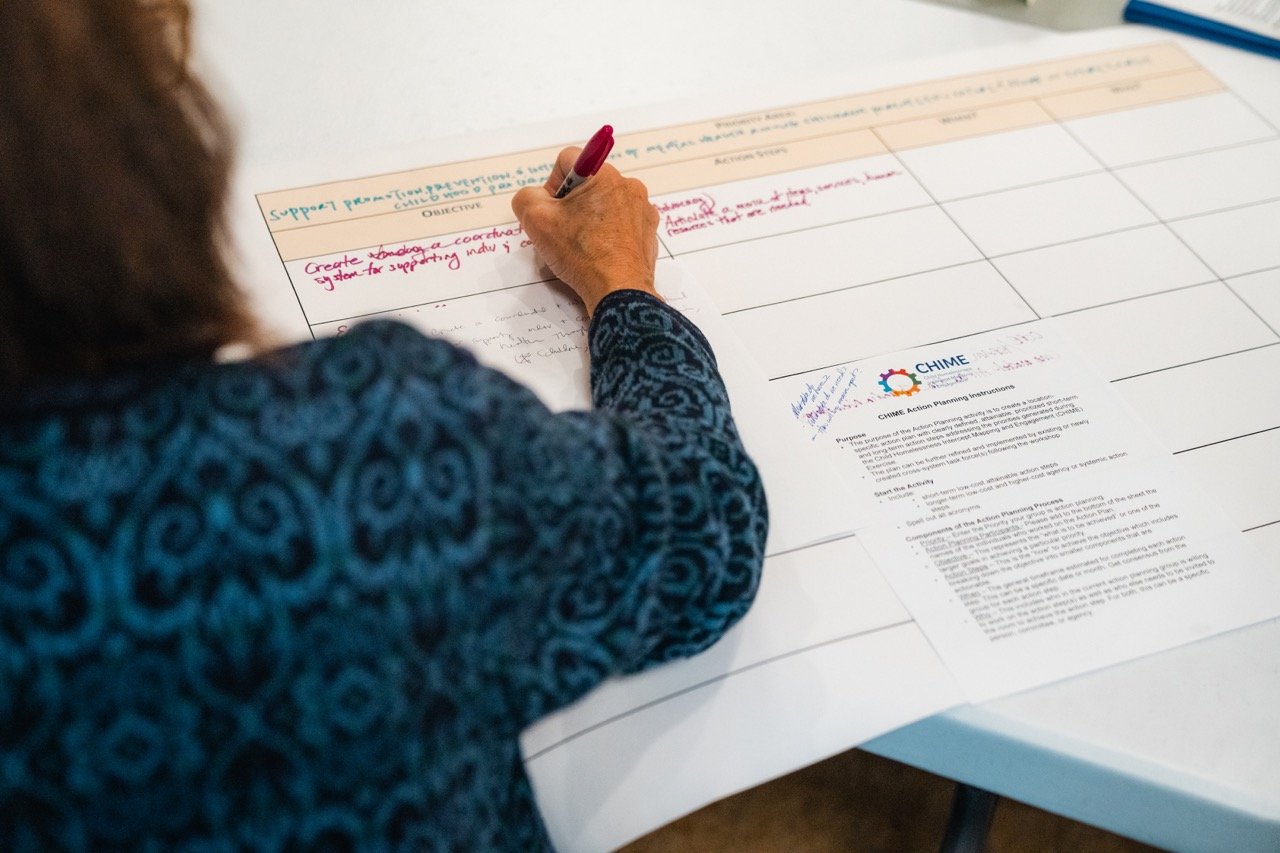Systems Mapping is a systems level intervention and Policy, Systems, and Environmental (PSE) change approach designed to improve the coordination, collaboration, and access to services within complex multi-system networks. The process of systems mapping utilizes an organizational framework to identify and address critical issues impacting the efficient and effective flow of people, data, and programs to improve the health and safety for our communities. Mappings provide stakeholders an opportunity to develop a system inventory, identify gaps and opportunities, and begin a strategic action plan. Dr. Kathleen Kemp has specific expertise in systems mapping with child homelessness systems, competency to stand trial processes, and juvenile legal/behavioral health system collaborations.
Collaborate while Mapping Gaps and Resources
In each mapping, participants are guided by expert facilitators to identify gaps in services, resources, and opportunities at distinct process points related to the specific area.
Identify and Vote on Priorities
Facilitators then guide participants through a brainstorming session with a group of community leaders, direct line staff, and people with lived experience. All participants then vote on the community-driven list of priorities for action.
Action Plan
During the action planning process, participants work in small groups to develop preliminary strategic plans for the priorities that received the most votes.
Child Homelessness Intercept Mapping and Engagement
(CHIME)
CHIME leverages the experience and research behind two evidence-informed practices: the Sequential Intercept Model (Munetz & Griffin, 2006)[1] mapping workshops and the Aspen Institute's Two-Generation (2Gen) framework (Aspen Institute, 2021)[2]. CHIME is a systems level intervention and Policy, Systems, and Environmental (PSE) Change approach designed to improve access to services and positive experiences for accompanied children experiencing homelessness. PSE Change approaches aim to sustain long-lasting, equitable changes within communities to provide all residents with opportunities for improved health and safety.
The centerpiece of CHIME is the development of a systems map through a 1.5 day community workshop. During the mapping process, facilitators, community leaders, front line staff, and people with lived experience collaborate to achieve three primary objectives:
1) Map the local systems serving accompanied children experiencing homelessness including resources, gaps, and opportunities.
2) Develop priorities based on community input and gain agreement from CHIME participants on the priorities to action plan.
3) Develop action plans to make measurable improvements on coordination of services for homeless children and families.
As part of the mapping activity, the facilitators work with the CHIME participants to identify resources and gaps. This process is important since the landscape of services are ever changing, and the resources and gaps provide contextual information for understanding the local map. Moreover, this catalog can be used by planners to establish greater opportunities for improving outcomes for accompanied children experiencing homelessness by addressing the gaps and building on existing resources.
One critical component of CHIME is gaining consensus among participants about priorities for change and beginning to create action plans to move the priorities forward. As part of the mapping activity, the facilitators work with the CHIME participants to identify and subsequently vote on potential priorities for change to start action planning. The final priorities receiving the most votes are then worked on by smaller groups of participants determined on a volunteer basis.
[1] The Sequential Intercept Model (SIM) is a framework and tool to facilitate cross-systems collaboration developed by Drs. Mark Munetz and Patty Griffin and implemented by Policy Research Associates, Inc.
[2] https://ascend-resources.aspeninstitute.org/resources/state-of-the-field-two-generation-approaches-to-family-well-being/
CHIME In Action
BostonCHIME began with the generous financial support of the Dana-Farber Cancer Institute to FamilyAid and a consortium of Boston community leaders who came together to draw attention to the needs of accompanied children experiencing homelessness (i.e., children 0-18 experiencing homelessness with a parent or legal guardian). The BostonCHIME project kicked off in June 2022 at Boston College with more than 80 state, city, academic, and community leaders.
Through their dedication and leadership, the BostonCHIME Executive Committee volunteered their time to support BostonCHIME. The BostonCHIME Executive Committee included: Kate Barrand, CEO, Horizons for Homeless Children; Sarah Bartley, Vice President, United Way of Massachusetts Bay and Merrimack Valley; Annissa Essaibi George, CEO of Big Sister Association of Greater Boston; Brian Marques, Sr. Director, Opportunity Youth, Boston Public Schools; Mark Reeves, Founder and CEO, New England Community Services; Monica Roberts, Executive Director, City Year Boston; Larry Seamans, President, FamilyAid; Snehal Shah, MD, MPH, Senior Faculty Advisor in the Office of Health Equity and Inclusion/ Associate Medical Director for Community Integration, Boston Children’s Hospital; and Christi Staples, Vice President, United Way of Massachusetts Bay and Merrimack Valley.
For more information about BostonCHIME and the mapping reports, visit their website: https://bostonchime.org/ and social media pages.
Boston Public Schools Superintendent Mary Skipper
"CHIME represents a significant step forward in addressing the needs of students and families experiencing homelessness in Boston. By mapping the services available to families and identifying gaps, we can better understand the challenges and work together to create meaningful solutions."
Dana-Farber Cancer Institute Vice-President of Community Health Magnolia Contreras
"The CHIME initiative is a critical part of the ongoing efforts to address the needs of students experiencing homelessness here in Boston. By bringing together a diverse group of stakeholders and leveraging the SIM approach, we are creating a more coordinated and effective system of support for vulnerable children and families."






